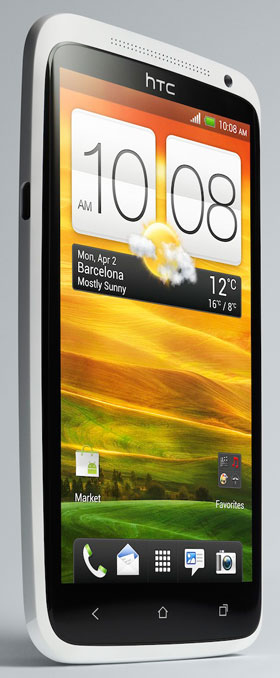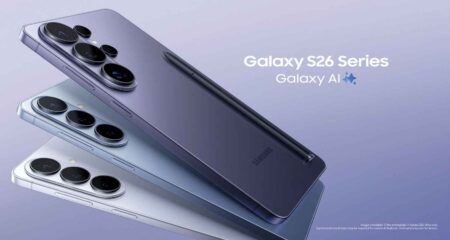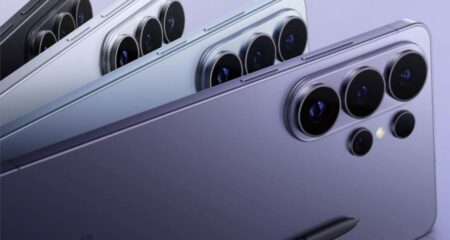
The battle lines have been drawn in the fight for the hearts, minds and wallets of Android users. In the blue corner it’s Korean giant Samsung Electronics, with its Galaxy S3. And in the green corner is plucky Taiwanese featherweight HTC with the One X. Both contenders have the mettle to take the top prize, but is it really a fair fight?
Samsung launched its greatly anticipated S3 in London on Thursday evening having miraculously maintained a veil of secrecy around the device of the sort usually only seen from rival Apple. Despite the hype, comments from attendees suggest that although the handset is chock full of the specifications you’d expect from a flagship device, it still feels a little, well, cheap.
HTC, meanwhile, has managed to get its new flagship device — the One X — to market sooner, with essentially the same specifications as Samsung’s offering and with a higher-end finish. But it just can’t match Samsung’s marketing budget, distribution network and brand recognition.
Even though the One X and S3 are so similar below the surface — they both boast quad-core processors, offer the same screen resolution, almost identical cameras and have almost the same weight and proportions — the sheer depth of Samsung’s pockets and its ability to flood billboards and magazines with advertising means its likely to win the long game.
Samsung also has its track record in its favour: while HTC has released some exceptional handsets during its lifetime — the Sensation most recently and the Desire before it, for example — it hasn’t been nearly as active as Samsung in the past 12 months. HTC remains a fairly niche brand.
Samsung, on the other hand, is rapidly becoming ubiquitous globally, helped in large part by the fact that, unlike HTC, it makes a wide range of devices beyond phones and tablets. Its monitors and televisions have become so commonplace in SA homes that Samsung’s brand recognition is second to none with local consumers — and the same holds true in most markets.
However, there is an argument to be made for the “personality” HTC’s devices offer consumers. Samsung devices may work superbly, but they’re colder and more clinical than HTC’s designs. Nevertheless, even if HTC’s product is more appealing than Samsung’s — and many would argue it isn’t — it simply can’t hope to compete meaningfully.
Steven Ambrose, MD of consulting firm Strategy Worx, says Samsung’s scale makes it almost unbeatable. “If you have scale you can dominate. That’s what Samsung’s strategy has been. It’s grown considerably by maintaining ultra-low margins and pushing its devices across the price spectrum. Aside from [Samsung’s] assets in manufacturing, its ability to roll out products consistently globally is almost unmatchable.”
Ambrose says there’s “no doubt” that the Korean manufacturer is going to be the dominant player in not only the high-end of the Android market, but in the Android market as a whole.
“The operator buy-in is insane,” he says. “Operators carry every model at every price point. Samsung’s brand collateral – in terms of being everywhere you look — is simply unrivalled.”
Although Ambrose says the HTC One X, which he has used, is “the best phone on the market today”, he says the Galaxy S3 remains a “tour de force”. He says the HTC deserves to do much better than it will, particularly in SA where it will have at least a month in the market as the only quad-core device before the S3 goes on sale. But it just can’t compete with Samsung’s marketing clout, he adds.

Before the S3’s launch, rumours abounded about it pushing the limits of in terms of specifications — the predictions included unheard of quantities of RAM and flash storage — but Ambrose says such grandstanding would’ve been unnecessary for Samsung.
“Samsung just needs to offer specifications that are as good as anything else on the market. Its scale, distribution and global brand awareness will keep it dominant. Frankly, it’s starting to look like a two-horse race between Apple’s iOS and Android, which is bad news for the other players.”
Those other players, including Nokia and Research in Motion’s BlackBerry, will be watching Samsung’s performance in coming months closely. Undoubtedly, it’s becoming the brand to beat. HTC, meanwhile, will have to make do with those consumers for whom bucking trends is important.
The mainstream has embraced Samsung, and it’s a love affair that shows no sign of waning. — (c) 2012 NewsCentral Media




